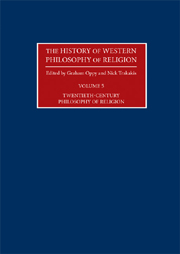Book contents
- Frontmatter
- Contents
- Editorial Introduction
- Contributors
- 1 Twentieth-Century Philosophy of Religion: An Introduction
- 2 William James
- 3 Henri Bergson
- 4 John Dewey
- 5 Alfred North Whitehead and Charles Hartshorne
- 6 Bertrand Russell
- 7 Max Scheler
- 8 Martin Buber
- 9 Jacques Maritain
- 10 Karl Jaspers
- 11 Paul Tillich
- 12 Karl Barth
- 13 Ludwig Wittgenstein
- 14 Martin Heidegger
- 15 Emmanuel Levinas
- 16 Simone Weil
- 17 A. J. Ayer
- 18 William P. Alston
- 19 John Hick
- 20 Mary Daly
- 21 Jacques Derrida
- 22 Alvin Plantinga
- 23 Richard Swinburne
- 24 Late-Twentieth-Century Atheism
- Chronology
- Bibliography
- Index
10 - Karl Jaspers
- Frontmatter
- Contents
- Editorial Introduction
- Contributors
- 1 Twentieth-Century Philosophy of Religion: An Introduction
- 2 William James
- 3 Henri Bergson
- 4 John Dewey
- 5 Alfred North Whitehead and Charles Hartshorne
- 6 Bertrand Russell
- 7 Max Scheler
- 8 Martin Buber
- 9 Jacques Maritain
- 10 Karl Jaspers
- 11 Paul Tillich
- 12 Karl Barth
- 13 Ludwig Wittgenstein
- 14 Martin Heidegger
- 15 Emmanuel Levinas
- 16 Simone Weil
- 17 A. J. Ayer
- 18 William P. Alston
- 19 John Hick
- 20 Mary Daly
- 21 Jacques Derrida
- 22 Alvin Plantinga
- 23 Richard Swinburne
- 24 Late-Twentieth-Century Atheism
- Chronology
- Bibliography
- Index
Summary
Jaspers was born in the city of Oldenburg in the northern part of Germany in 1883. He studied medicine at the universities of Munich, Göttingen and Heidelberg. Early in his youth he had to recognize that he was inflicted with an incurable lung disease that significantly influenced his daily physical activities. Jaspers did not begin his academic career as a professional philosopher. He wrote his doctoral thesis (1909) on a psychiatric problem and worked for some years as a voluntary research assistant at the Heidelberg psychiatric hospital, before becoming a professor of psychology at the University of Heidelberg in 1916. It was not until 1920 that he became a professor of philosophy at the same university. His first major work, General Psychopathology (1913), is a study in the methodology of psychiatry. He developed his existentialism in the three Philosophy volumes published in 1932. After the Nazis came to power in Germany in 1933, Jaspers was excluded from all administrative duties at the University of Heidelberg. In 1937 he was denied the right to teach, and a year later he was forbidden to publish. Until the very end of the Second World War, Jaspers and his wife, who was of Jewish origin, were in constant danger of being deported to an extermination camp. In 1948 Jaspers moved from Heidelberg to Switzerland where he earned a professorship at the University of Basel. There he wrote The Origin and Goal of History (1950) as well as his major contribution to political philosophy, The Atom Bomb and the Future of Man (1958).
- Type
- Chapter
- Information
- The History of Western Philosophy of Religion , pp. 119 - 132Publisher: Acumen PublishingPrint publication year: 2009
- 1
- Cited by

